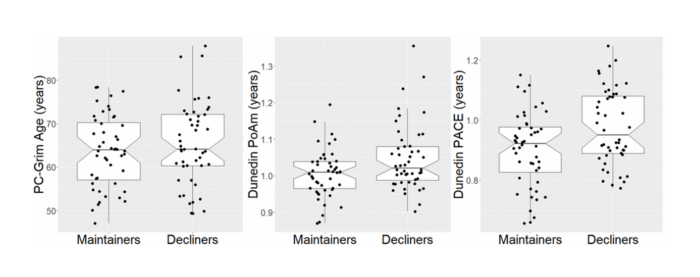“This is the first report to explore changes over time in several of the latest DNAm biological aging measures […]”

Credit: 2022 Reed et al.
“This is the first report to explore changes over time in several of the latest DNAm biological aging measures […]”
BUFFALO, NY- December 29, 2022 – A new research paper was published in Aging (listed as “Aging (Albany NY)” by MEDLINE/PubMed and “Aging-US” by Web of Science) Volume 14, Issue 23, entitled, “DNA methylation-based measures of biological aging and cognitive decline over 16-years: preliminary longitudinal findings in midlife.”
DNA methylation-based (DNAm) measures of biological aging associate with increased risk of morbidity and mortality, but their links with cognitive decline are less established.
In this new study, researchers Rebecca G. Reed, Judith E. Carroll, Anna L. Marsland, and Stephen B. Manuck from the University of Pittsburgh and the University of California examined changes over a 16-year interval in epigenetic clocks (the traditional and principal components [PC]-based Horvath, Hannum, PhenoAge, GrimAge) and pace of aging measures (Dunedin PoAm, Dunedin PACE) in 48 midlife adults enrolled in the longitudinal arm of the Adult Health and Behavior project (56% Female, baseline AgeM = 44.7 years), selected for discrepant cognitive trajectories.
“We hypothesized that overall, cognitive Decliners would be biologically older compared to cognitive Maintainers.”
Cognitive Decliners (N = 24) were selected based on declines in a composite score derived from neuropsychological tests and matched with participants who did not show any decline, Maintainers (N = 24). Multilevel models with repeated DNAm measures within person tested the main effects of time, group, and group by time interactions. DNAm measures significantly increased over time generally consistent with elapsed time between study visits.
There were also group differences: overall, Cognitive Decliners had an older PC-GrimAge and faster pace of aging (Dunedin PoAm, Dunedin PACE) than Cognitive Maintainers. There were no significant group by time interactions, suggesting accelerated epigenetic aging in Decliners remained constant over time. Older PC-GrimAge and faster pace of aging may be particularly sensitive to cognitive decline in midlife.
“In conclusion, these preliminary results suggest PC-GrimAge and DNAm based pace of aging measures (Dunedin PoAm and PACE) associate with 16-year, neuropsychologically-validated cognitive decline in midlife. The results warrant a larger-scale study to better examine longitudinal associations between changes in DNAm measures and changes across multiple cognitive domains. Ultimately, establishing DNAm measures as biomarkers of cognitive function in midlife may offer pre-clinical markers of a molecular aging mechanism that can help identify individuals at increased risk for cognitive impairment and dementia in later life.”
DOI: https://doi.org/10.18632/aging.204376
Corresponding Author: Rebecca G. Reed
Corresponding Email: [email protected]
Keywords: epigenetic age, aging biomarker, pace of aging, geroscience, cognitive aging
Sign up for free Altmetric alerts about this article: https://aging.altmetric.com/details/email_updates?id=10.18632%2Faging.204376
About Aging-US:
Launched in 2009, Aging (Aging-US) publishes papers of general interest and biological significance in all fields of aging research and age-related diseases, including cancer—and now, with a special focus on COVID-19 vulnerability as an age-dependent syndrome. Topics in Aging go beyond traditional gerontology, including, but not limited to, cellular and molecular biology, human age-related diseases, pathology in model organisms, signal transduction pathways (e.g., p53, sirtuins, and PI-3K/AKT/mTOR, among others), and approaches to modulating these signaling pathways.
Please visit our website at www.Aging-US.com and connect with us:
- SoundCloud – https://soundcloud.com/Aging-Us
- Facebook – https://www.facebook.com/AgingUS/
- Twitter – https://twitter.com/AgingJrnl
- Instagram – https://www.instagram.com/agingjrnl/
- YouTube – https://www.youtube.com/agingus
- LinkedIn – https://www.linkedin.com/company/aging/
- Reddit – https://www.reddit.com/user/AgingUS
- Pinterest – https://www.pinterest.com/AgingUS/
For media inquiries, please contact [email protected].
Aging (Aging-US) Journal Office
6666 E. Quaker Str., Suite 1B
Orchard Park, NY 14127
Phone: 1-800-922-0957, option 1
###
Journal
Aging-US
DOI
10.18632/aging.204376
Method of Research
Observational study
Subject of Research
Human tissue samples
Article Title
DNA methylation-based measures of biological aging and cognitive decline over 16-years: preliminary longitudinal findings in midlife
Article Publication Date
11-Nov-2022




